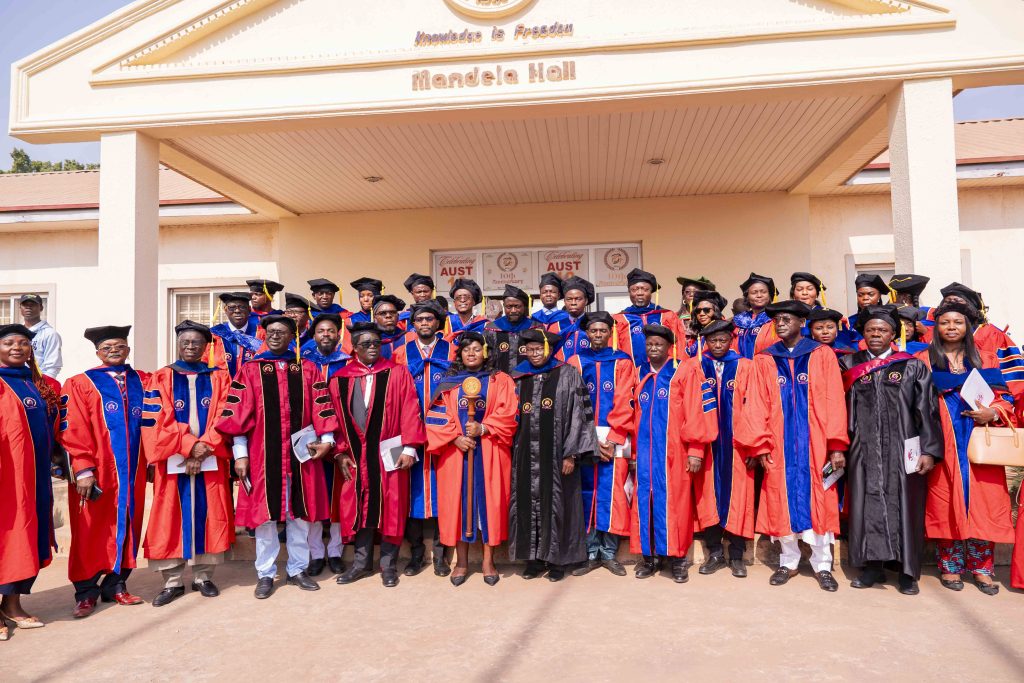
Director-general of the World Trade Organisation, Dr. Ngozi Okonjo-Iweala and other stakeholders have touted artificial intelligence as having the ability to drive Nigeria’s socio-economic development.
Okonjo-Iweala, who noted this, was speaking alongside other keynote presenters at the 10th convocation ceremony of the Africa University of Science and Technology (AUST) in Abuja. They expressed a unanimous belief that AI can help address the country’s economic challenges.
Okonjo-Iweala, spoke on the topic ‘Artificial Intelligence (AI) and Frontier Technologies: Harnessing Opportunities and Tackling Challenges to Drive Africa’s Development.’ She stated that AI has the potential to resolve issues that have hindered Nigeria’s economic progress for decades.
According to the WTO chief, AI could contribute $136 billion in productivity gains, cost savings, time savings, and increased revenues across Nigeria, Kenya, Ghana and South Africa, with Nigeria expected to capture 43 per cent of this benefit due to its proactive national AI strategy.
Okonjo-Iweala pointed out AI’s potential to transform key sectors. For instance, in education, AI could tailor lessons for students in underserved areas. In healthcare, AI could improve diagnostics and patient care in regions lacking adequate medical professionals. In agriculture, AI tools could enhance crop yields through precise pest management and soil analysis. Companies like Crop2Cash and Thrive Agric are already using AI to support farmers.
She also mentioned that Nigerian firms such as Rensource are leveraging AI to optimise off-grid energy solutions. In the financial sector, AI could widen access to credit for small businesses and individuals who are excluded from formal banking systems.
The WTO director-general commended AUST for its commitment to AI education, citing its programmes in machine learning, healthcare, and the creative industries.
“Universities like AUST play a crucial role in understanding what AI means for Nigeria’s development and the continent as a whole, as well as how we can seize opportunities while managing the associated risks,” she said. “Important questions remain: What infrastructure is necessary for people across Africa and Nigeria to benefit from the AI revolution? What skills do we need to cultivate? What investments should governments make to capitalize on these opportunities?”
“AI promises to be instrumental in addressing challenges that have plagued Nigeria’s economic progress for decades,” she emphasised. Addressing the graduating class, Okonjo-Iweala urged them to embrace innovation and commit to lifelong learning.
“You graduates are not just recipients of this transformation but also its architects. As you leave this university, I encourage you to commit to lifelong learning and innovation and to build solutions that tackle both local and global challenges. Never stop striving for excellence,” she added.
She concluded by urging African governments to act swiftly to close the digital divide and capitalise on AI for sustainable development. “We cannot afford to be left behind,” she said.
In a related development, the director-general of the National Identity Management Commission, Engr. Abisoye Coker-Odusote who received an honorary doctorate at the event, emphasised the importance of a robust identity management system for Nigeria.
“As Nigeria transitions from an oil-dependent economy to a more diversified structure, a strong identity management system is foundational,” she remarked.
AUST president, Prof. Peter Onwualu pledged to establish centres of excellence across Africa to combat brain drain and produce technology-driven graduates equipped with skills in AI, data science and entrepreneurship.
“Our goal is to produce industry-ready graduates with technological skills and students competent in both hard and soft skills through project-based learning, outcome-based learning and critical thinking approaches. The curriculum for every programme at the university is being modified to incorporate knowledge of artificial intelligence, data sciences and entrepreneurship,” he stated.
The convocation ceremony awarded postgraduate diplomas, master’s degrees, PhDs and honorary doctorates to 58 students. Notable recipients of honorary awards included chairman of TETFund, Kashim Ibrahim-Imam; Secretary to the Government of the Federation, Sen. George Akume and group managing director of UBA, Oliver Alawuba.


